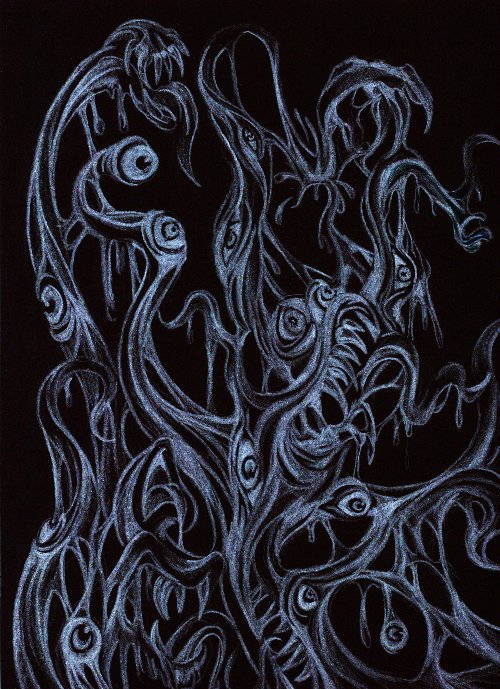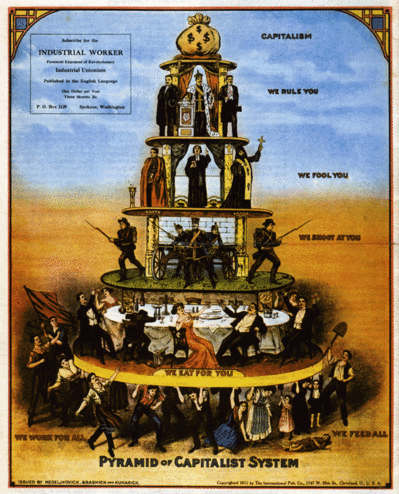November 28, 2005
Left Hyperstition 1: The Fictions of Capital

The phrase, above all others, that haunted this weekend's superb conference at Birkbeck , 'Is a Politics of Truth Still Thinkable?', was one of Lacan's most gnomic and provacative formulations: 'truth has the structure of fiction'. Fiction featured centrally in both Badiou and Zizek's different but complementary analyses on Saturday. For Badiou, the challenge was the production of new fictions; for Zizek, the problem was escaping the already-operative fictions of Capital. Badiou's call for new fictions will be discussed in the next post. In this post, I'm going to concentrate on Zizek's analyses of the fictions of capital.
(Incidentally, the weekend yielded sufficient material for ten posts at the very least. I don't propose to undertake the vast task of summarising all six of the papers, but I'm confident that their concerns will seep into posts over the next few weeks.)
One point of Lacan's claim - typically frustrating and intriguing in equal measure - was that truth cannot be apprehended directly, only via anamorphosis. It was made in connection with Hamlet or, more precisely, about the play-within-a-play in Hamlet* (perhaps suggesting that, really, the formula should be that 'truth has the structure of a fiction within a fiction'). Partly what is at stake here - something which Lorenzo Chiesa brought about in his elegant problematization of Lacan's relationship to Marxism on Friday - is the idea that the unconscious cannot lie. Which is at the simplest level is only to reiterate the oldest and most familiar lessons of psychoanalysis: slips of the tongue, dreams, symptoms give us access to a truth which cannot be accessed directly.
In any case, the truth sought over the weekend was not the immediate - and unmediated - totalitarian revelation negatively invoked by Nietzschean-Rortian postmodernism. It is that tradition of thought which has made a 'politics of truth' unthinkable, in both the conceptual and the ethical senses. For such compulsory scepticism, a politics of truth is unthinkable in the same way that nuclear war is unthinkable. We are warned that, without the prophylaxes of ironic distanciation and language game perspectivism, we shall fall victim to a fanaticism which, whether it takes the form of totalitarianism or fundamentalism, is always deadly. (Alberto Toscano's lecture on Saturday was invaluable because it presented a detailed genealogical analysis, passing from Thomas Muntzer's 14th century millenarian preaching through to the Iranian Revolution as observed by Foucault - of how this equivalence - between a politics of truth and fanaticism - had come to be made. +)

To Zizek, then. His target - after a dis-spiriting start wherein he re-cycled his already over-familiar recent riffs on New Orleans and France - was Laclau's attempt to rehabilitate populism. Laclau rejects the 'liberal elite' view that the populist is always proto-fascist, arguing that populism, whilst it is capable of such excesses, is in itself neutral, equally open to utilization by emancipatory currents. Populism, according to Laclau, is to be preferred to 'class struggle' because it does not posit a single, privileged agent or cause. Instead of a monomaniacal focus on the working class, populist uprisings can have at their core anti-racist, anti-colonial, anti-patriarchal (or any other) struggles.
What is wrong with this picture? Well, Zizek said, populism is inherently reformist, if not to say reactionary. Its fundamental fantasy is of an Intruder, or more usually a group of intruders, who have corrupted the system. Hence the problem is never the system, capitalism, but the oligarchy, this particular, lazy, exploitative bunch who happen to have control now. Once They are removed, everything will be alright... Hence populism always frame its project in terms of a series of demands addressed to the ruling elite. Antagonism is defused into a craving for recognition. (To push this analysis further: it's clear that the (entirely complementary) obverse of the demand for recognition is the demand that this or that politician resign, which is why endlessly 'renewed calls' for resignation are constant background noise on the post-political scene.)
This, then, is the reason why class struggle should remain the privileged model. To insist on class struggle occupying a position of centrality is precisely not to invoke the 'working class' as the only agent of emancipation. In a sense, that is already to treat class insurgency as if it were yet another 'multi-cultural' demand for recognition. It's perfectly possible to imagine a capitalism in which, for instance, the demand for recognition of alternative sexualities has been entirely satisfied. But class struggle in the Marxist sense could not be satisfied by anything short of the 'obliteration of bourgeoisie as a symbolic social space' (which is by no means the same thing as the extermination of the members of the bourgeoisie). In a very real sense, the proletariat is that very obliteration. This point is perhaps best made by a joke recently recounted by Lenin on the Tomb. An IRA man in a balaclava is at the gates of heaven when St Peter comes to him and says, 'I'm afraid I can't let you in'. 'Who wants to get in?' the IRA man retorts. 'You've got twenty minutes to get the fuck out.'
For Zizek, Laclau makes the mistake of treating the critique of political economy as a 'positive ontic science' (just as his dismissal of class struggle makes the mistake of treating the proletariat as if it were a positive ontic entity, 'the working class', rather than a 'substance-less subject'). What this ignores is what Zizek, after Derrida, called the 'spectral' dimension of Marx. In Marx's 'hauntology' - where undead labour is the correlate of vitalized commodities - it is understood that fiction structures reality. To call capital a 'self-engendering monster' is not at all to speak metaphorically.
There is a lot to be done with this. Firstly, we can recognize the current political landscape as inherently populist. It is not only, as Zizek said, that populism (whether it be the 'progressive' populism of the anti-capitalist or anti-globalization movements or the reactionary populism of the fuel protesters or the Countryside Alliance) is the complement to administrative post-politics. It is that administrative post-politics is already itself populist. Badiou has argued that post-political malaise is not some accidental side-effect of parliamentary democracy but the terminal phase into which it inevitably declines. The dreary face-off between Blair's authoritarian marketism and Michael 'are you thinking what we're thinking?' Howard's gimcrack xenophobism at the last British election is one indication that capitalist parliamentarianism might in the end only be able to yield the melancholy spectacle of unpopular populisms. (Bush versus Kerry was another example of the same trend, of course.) Populism has little to do with popularity (no matter how far its support dwindles, the UK Independence Party will always be populist, for example) and everything to do with a reified notion of popular will, where 'popular' designates 'what is already accepted' rather than any kind of numerical pre-eminence. Populism projects a restricted sense of possibilities, always offers us a choice from a fixed and pre-existent menu. It is the expression of the always-already, the anti-Event.
This goes some way to explaining the querelous status quo that settles around successful post-political administrators like Blair and Bush. Their continued success is as inevitable as the grumbling discontent which accompanies it like a permanent drizzle. Their success is predicated on a populist appeal to the already accepted, to the Inevitable, which can only ever inspire a disappointed ratification, never commitment or fervour. On the current political scene, 'a politics of truth' is precluded, not by fear of the totalitarian big Brother, but by genuflections to the post-political big Other. Zizek mourned the loss of leaders who can know what we want more than we do ourselves. (Nietzsche was at his most perspicacious in his anticipation of the 'autonomous herding' of contemporary democracy.) Commitment and fidelity cannot survive the expeditious adaptation to focus-group/media-generated 'popular will' which post-political success entails. (In this respect, Blair, who has gone from being unable to utter a sentence unless it was cleared with a focus group to the suicidal fidelity of his Iraq misadventure is something of an enigma and an anomaly.)

The second big lesson concerns the form of an effective anti-capitalism. Anti-capitalism cannot restrict itself to a set of populist demands any more that it can realistically hope that unicycycling and juggling will spontaneously produce a ludic carnivalesque detournement of the global order. As I pointed out at the time of live8, Everyone - which is to say, All Opinion - agrees with populist calls that capitalism be 'reformed'. But one cannot reform capitalism, because, in a very real sense, capitalism is reform itself: a monster that is not only self-engendering, but also shoggothically protean in its perpetual reconstructions of itself . (Not for nothing is 'reform' the constantly reiterated mantra in the neo-liberal Bible, the Economist). Furthermore, to whom are any 'demands' to be addressed? Anti-capitalism will always be guilty of the 'populist temptation' while it continues to posit a corrupt oligarchy who need only be replaced, or worse, persuaded. The error here is not simply the illusion that 'this particular leadership' are the problem, it is the idea that capitalism has any sort of leadership at all. The administrators' washing of hands which they claim are always tied is not merely an act of self-exculpation; it really is the case that they are the slaves of the remorseless machine of Capital. No-one driving.
One of Zizek's greatest strengths has always been his hyperstitional account of the way in which capitalism runs by generating beliefs and behaviours. Behaviour anticipates belief, in a causal, not a merely predictive, sense. Perhaps that isn't going far enough: it would be better to say that behaviours are already beliefs, Pascalian 'beliefs before beliefs'. Yet ideology, as I've argued before, resides in the (apparent) discrepancy between belief and behaviour. At the level of cognition, people 'know perfectly well' that money is only a token, that commodities aren't alive, yet they behave 'as if' money is a real substantiality and that commodities are a natural force. Such activity is, needless to say, more than sufficient for the purposes of the replication of Capital. But where, here, is the properly fictional level? Does it reside with Capital or with the 'autonomous' individual? Perhaps the relationship between the two is exactly that of a fiction-within-a-fiction: the vast, planetary Science Fiction of Capital generates the implexed fiction of the psycho-biographical individual it feeds upon.
But the real money question is: how are we to dispense with these fictions? If SF Capital installs itself through ritualized behaviours of commodity-compliance, we have to conclude that the only way to rid ourselves of such fictions is to practise new behaviours, new rituals. And that is inseparable from the question of new economic models.
* As Susan Willis explains: 'The prince uses the little drama to create a structure, a dimension of ‘truth disguised’ as a fiction in order to make Claudius betray himself. It is not the narrative (Claudius pouring the poison in the erstwhile king’s ear), but the play scene as a structure that reveals the truth of Hamlet’s Oedipal quandary: in seeing the performed action, Hamlet catches himself allied with his father’s murderer, complicit with him in the desire for his mother. Here, the real is not a kernel, conveniently rock hard and discernable through the veil of fiction; it is instead the very structure, the warp and weft of the veils.'
+ One of the most interesting aspects of Alberto's paper was its discussion of Foucault, which reminded me of some of the issues Tim raised in his latest post on The Wrong Side of Capitalism. Juxtaposing Foucault's Preface to Anti-Oedipus, in which he condemns any attempt to ground politics in a truth, with his enthusiasm for the Iranian Revolution's 'spiritualization of politics' produces quite a vignette.
Posted by mark at November 28, 2005 09:35 PM | TrackBack